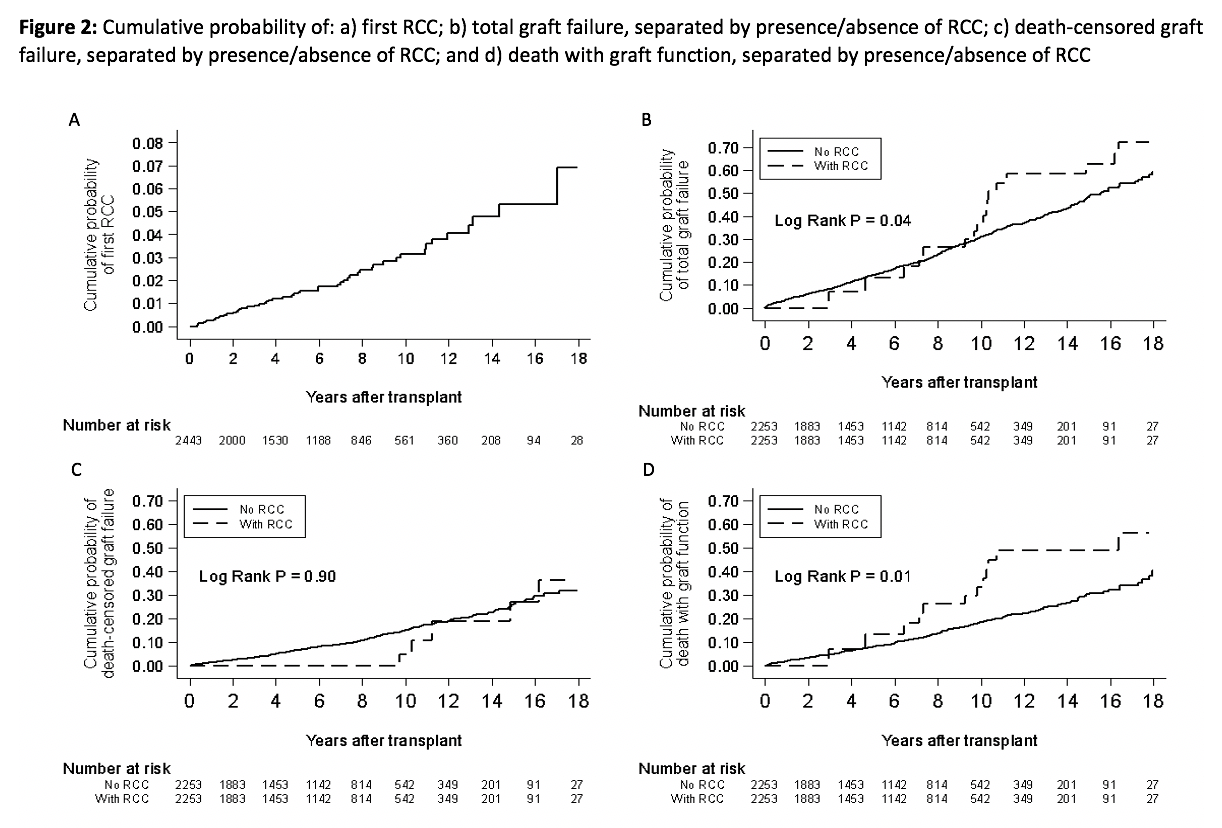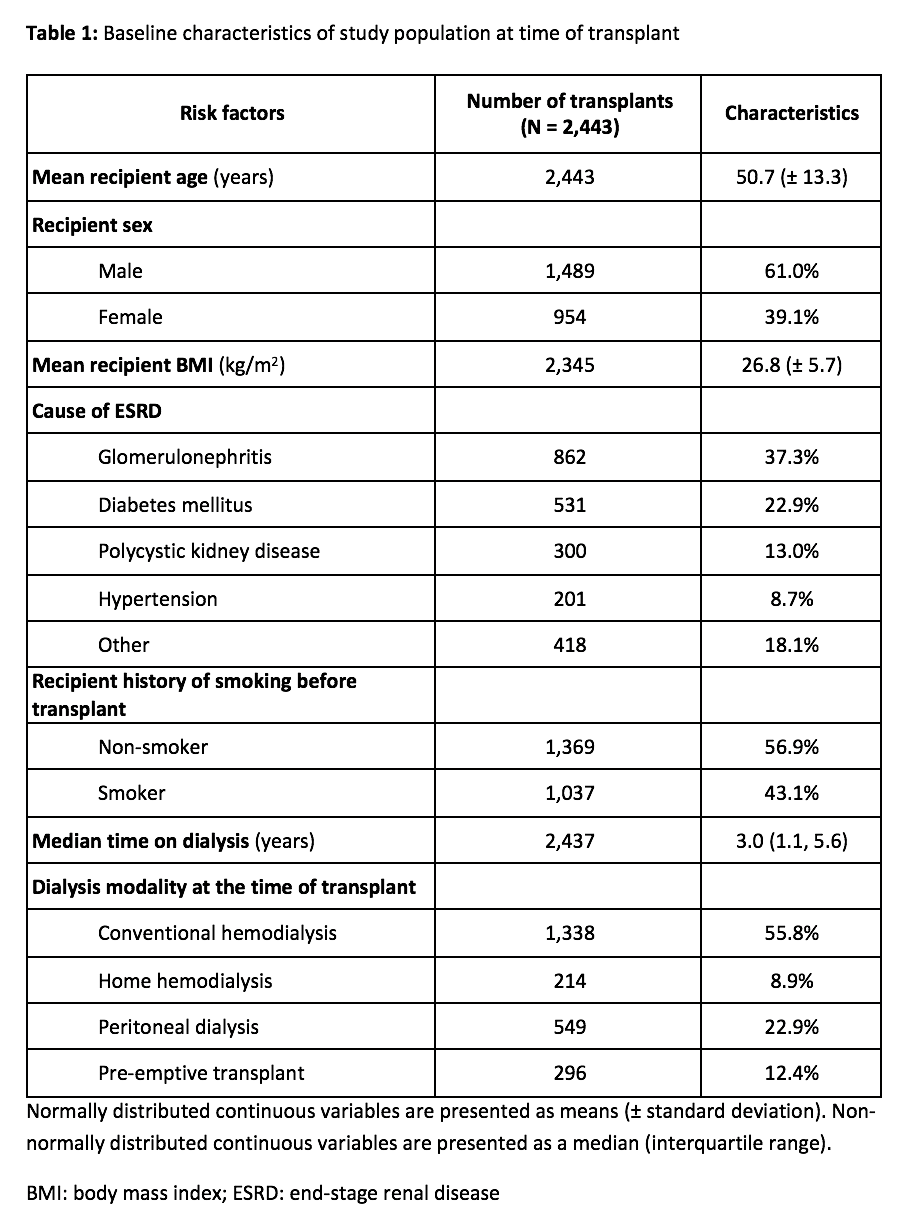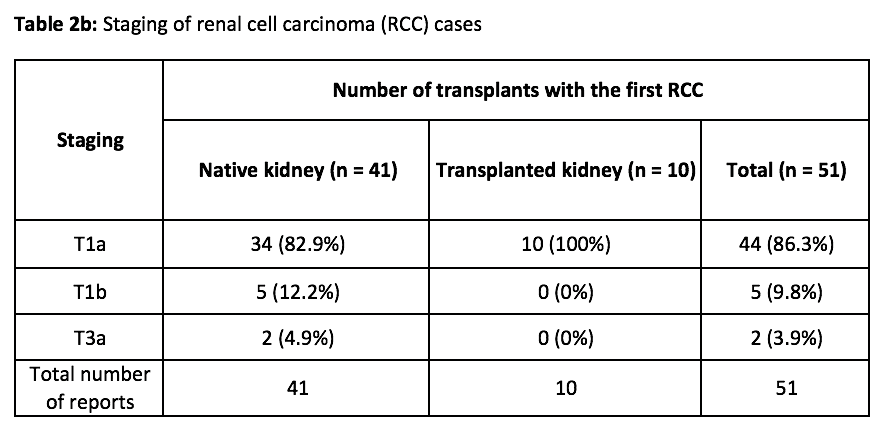Back
Poster, Podium & Video Sessions
Moderated Poster
MP36: Renal Transplantation & Vascular Surgery
MP36-08: RCC in kidney transplant recipients: Incidence, trends, clinical management and outcomes
Sunday, May 15, 2022
7:00 AM – 8:15 AM
Location: Room 228
Jason Lee*, Michelle Minkovich, Rebecca Wong, Olusegun Famure, Yanhong Li, Joseph Kim, Toronto, Canada

Jason Young Lee, MD
University of Toronto
Poster Presenter(s)
Introduction: Renal cell carcinoma (RCC) is a relatively common malignancy among kidney transplant recipients (KTR), with risk reported to be 6-15x greater than the general population. RCC among KTR has also been associated with worse graft and overall survival. We aimed to describe the incidence, characteristics, clinical management, and outcomes of RCC among a large, single centre cohort of KTR.
Methods: We conducted an observational cohort study looking at KTR who received a graft between January 2000 and December 2017 (n = 2,443) with =1 year of follow-up. Simultaneous kidney/pancreas transplants were excluded. The Kaplan-Meier product-limit method was used to determine the incidence of RCC. Descriptive analyses were employed to examine the characteristics and management of RCC. Risk factors and clinical outcomes were analyzed using Cox regression models.
Results: The incidence of RCC among our cohort was 0.32 per 100 person-years, 2.1% of all KTRs. Almost half (47.1%) of cases occurred within the first 4 years post-transplant. The majority of cases were T1a (86.3%), clear-cell (45.1%), and in the native kidney (80.4%). A higher proportion of KTR with RCC had other malignancies versus KTR without RCC. RCC in the native kidney was associated with greater risk of death with graft function; overall mortality, but not cancer-specific mortality, at 2- and 5-years post-transplant was higher among KTR with RCC than those without.
Conclusions: Majority of RCC cases in KTR occur in the native kidneys and are low stage, low grade, but have a slightly different histologic variant mix than the general population. Oncologic outcomes were excellent overall but native kidney RCC was found to be significantly associated with death with graft function and overall, but not cancer-specific, mortality was found to be higher in KTR with RCC.
Source of Funding: 0



Methods: We conducted an observational cohort study looking at KTR who received a graft between January 2000 and December 2017 (n = 2,443) with =1 year of follow-up. Simultaneous kidney/pancreas transplants were excluded. The Kaplan-Meier product-limit method was used to determine the incidence of RCC. Descriptive analyses were employed to examine the characteristics and management of RCC. Risk factors and clinical outcomes were analyzed using Cox regression models.
Results: The incidence of RCC among our cohort was 0.32 per 100 person-years, 2.1% of all KTRs. Almost half (47.1%) of cases occurred within the first 4 years post-transplant. The majority of cases were T1a (86.3%), clear-cell (45.1%), and in the native kidney (80.4%). A higher proportion of KTR with RCC had other malignancies versus KTR without RCC. RCC in the native kidney was associated with greater risk of death with graft function; overall mortality, but not cancer-specific mortality, at 2- and 5-years post-transplant was higher among KTR with RCC than those without.
Conclusions: Majority of RCC cases in KTR occur in the native kidneys and are low stage, low grade, but have a slightly different histologic variant mix than the general population. Oncologic outcomes were excellent overall but native kidney RCC was found to be significantly associated with death with graft function and overall, but not cancer-specific, mortality was found to be higher in KTR with RCC.
Source of Funding: 0




.jpg)
.jpg)